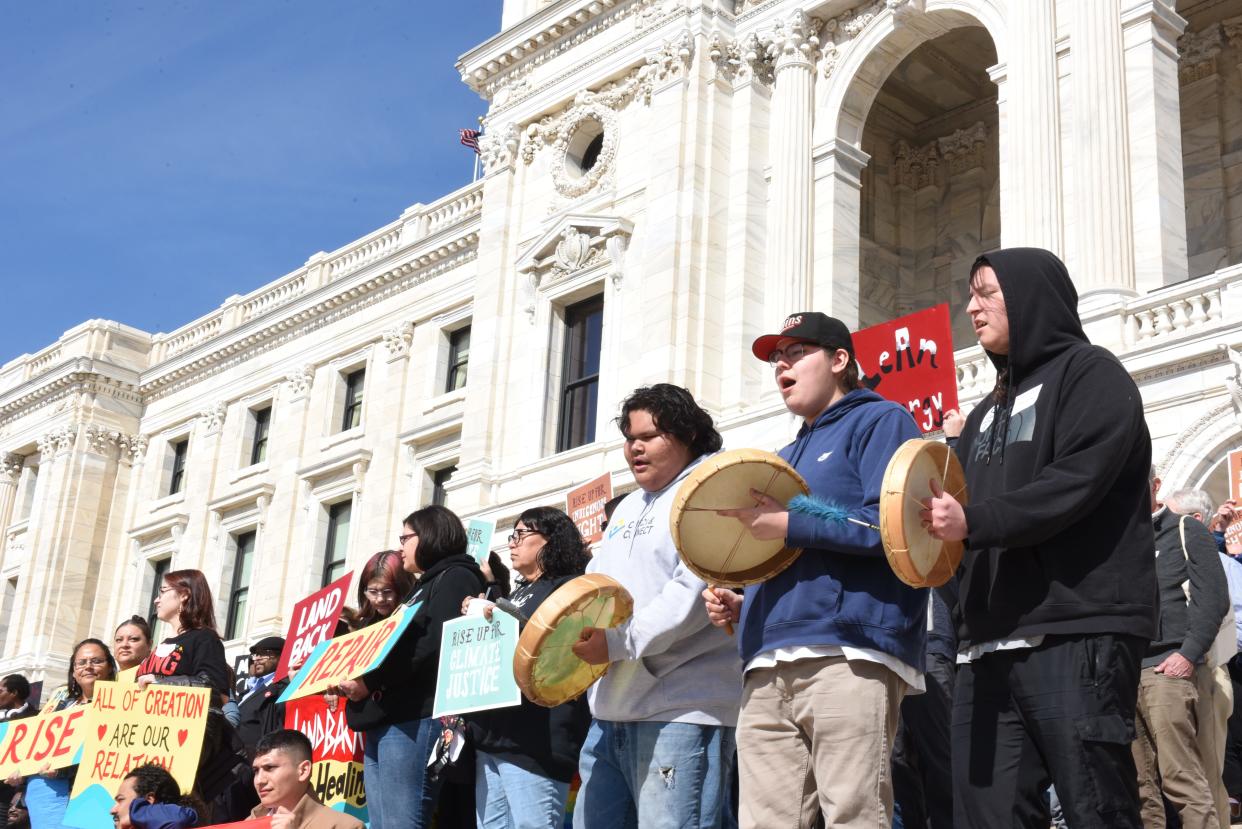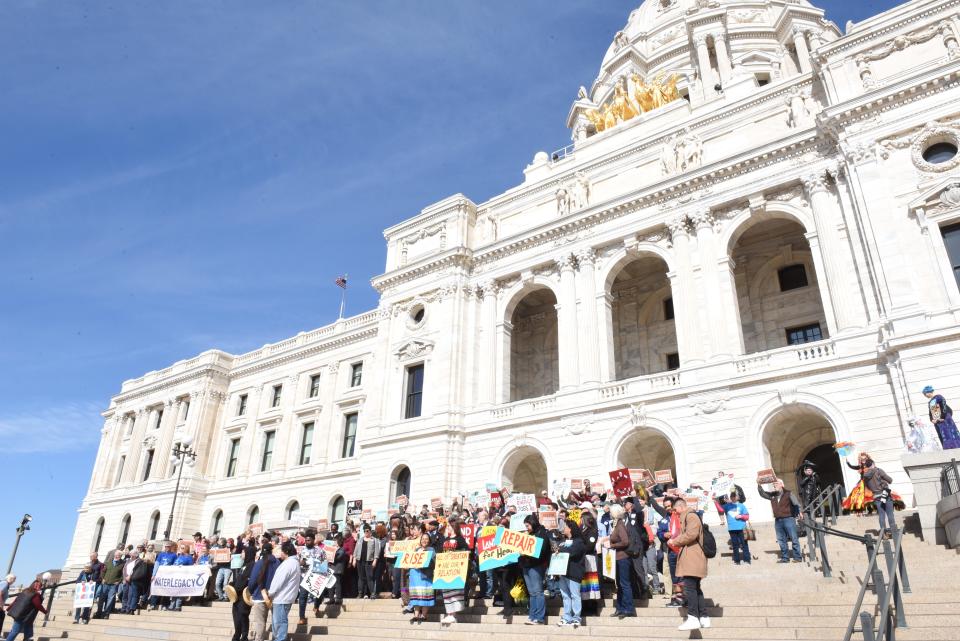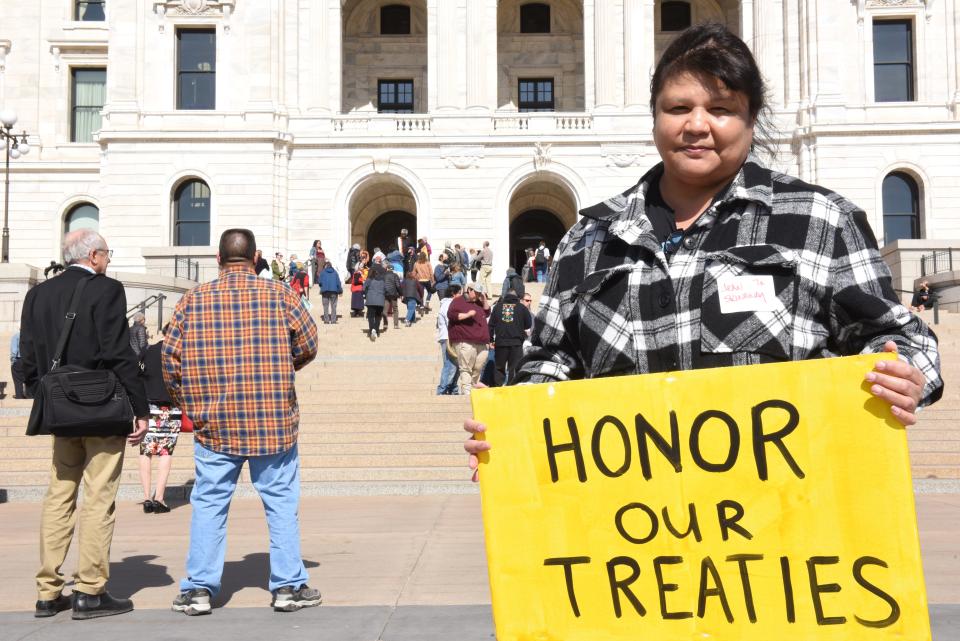Climate and Indigenous rights activists lobby at Capitol

ST. PAUL — Tuesday March 11, Indigenous rights and climate justice advocates from around the state gathered at the Capitol to meet with legislators.
The effort was led by Rise and Repair, a grassroots coalition of community organizations dedicated to lobbying for Indigenous rights and climate policy. The group spent the day rallying in St. Paul and met with 60 legislators to discuss their agenda for the session. Over 100 gathered on the steps of the Capitol, and organizers claimed 400 attended inside.
Sign up for Your Vote: Text USA TODAY reporters and the elections team by joining our SMS service.
Minnesota Interfaith Power and Light was one of a number of faith, environmental and Indigenous groups that took part in the lobbying day. Executive director Julia Nerbonne told the St. Cloud Times that it's impossible to separate the advocacy for the changing climate and that of protecting Indigenous rights.
"We think environmental justice and climate justice is really integrally connected with Indigenous rights and the rights of the manoomin [wild rice]," she said.
In the month the legislature has been in session, a number of bills were introduced to address these concerns and are making their way through committee. Nerbonne said they wouldn't have gotten this far without that advocacy of community coalitions like Rise and Repair.
"This is a place that has not ultimately been accessible to many people," Nerbonne said. "So to see so many Native folks from all over Minnesota come together to have these very important conversations with their legislators, I think it is making a huge difference."

A jam-packed legislative agenda
The Rise and Repair coalition is advocating for a number of bills and resolutions aimed at protecting Indigenous culture, sovereignty, and returning land.
One bill would return 155,000 acres of land back to the White Earth Band of Ojibwe and a separate bill proposes the return of state-owned forestry land that was transferred to the University of Minnesota back to the Fond du Lac Band of Lake Superior Chippewa.
Other bills focusing on climate policy include the protection of treaty lands by the Department of Natural Resources, the Climate Justice Education Bill, and a bill that would incentivize recycling by requiring producers to pay for packaging recycling.
A resolution for plant species rights
Beyond reparations and ensuring Minnesota is playing an active part in climate justice reform, the Rise and Repair coalition is advocating for the protection of Indigenous culture and the sacred grain known as "manoomin."

Manoomin is Ojibwe for wild rice, and Jean Skinaway Lawrence came to the Capitol to advocate for its rights.
Lawrence is the chairwoman of the Sandy Lake Band of Mississippi Chippewa in Northern Minnesota and told the St. Cloud Times she has seen firsthand the effects of climate change and neglect for the grain that is so important to her everyday life.
Lawrence and her tribe rely on the federally protected Rice Lake National Wildlife Refuge to harvest manoomin. On an average year, her tribe can harvest 200 pounds a day, but recent droughts have been "detrimental" to wild rice production, she said.
"I eat rice every day," Lawrence said. "For us, it's sacred, it's a part of our culture."
The waters that Lawrence once relied on are not dependable and local tribes have started to harvest in state lakes that are unprotected and often polluted.
This decrease in supply and inaccessibility to clean waters impacts not only daily lives, but essential practices for Lawrence's culture. She said that manoomin is given to Ojibwe children as well as elders for important ceremonies.
"It's your first food," Lawrence said, "It's also your last food."
The resolution to recognize manoomin is modeled after the 2018 resolution
"That's why [the Ojibwe peoples] are here, for the food that grows on water," Lawrence said. "The resolution is something that's needed to maintain our culture."
— Sam Woodward is the Minnesota elections reporting fellow for USA Today. You can reach her at swoodward@gannett.com or on X @woodyreports.
This article originally appeared on St. Cloud Times: Climate justice and Indigenous rights day at Capitol

